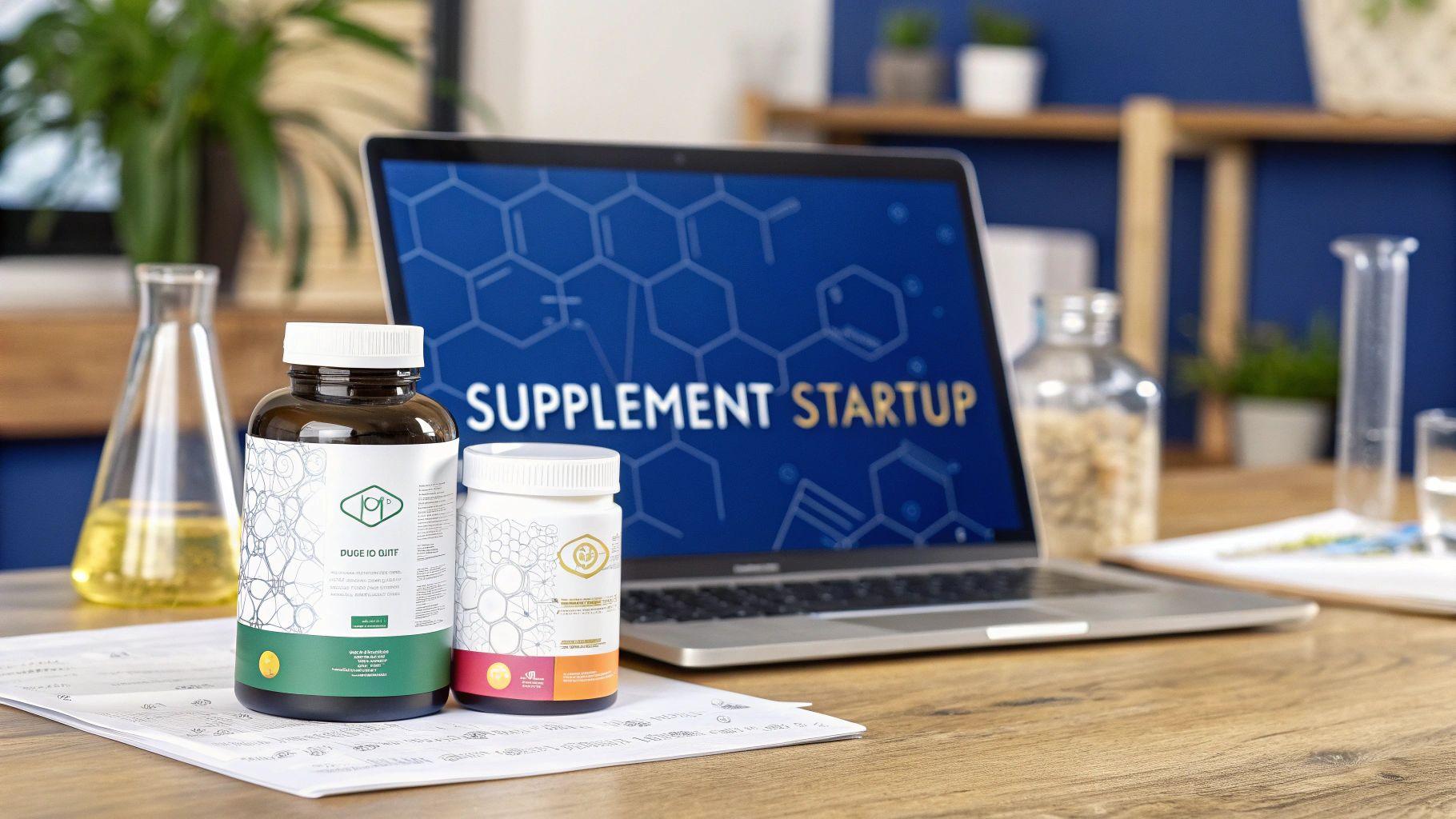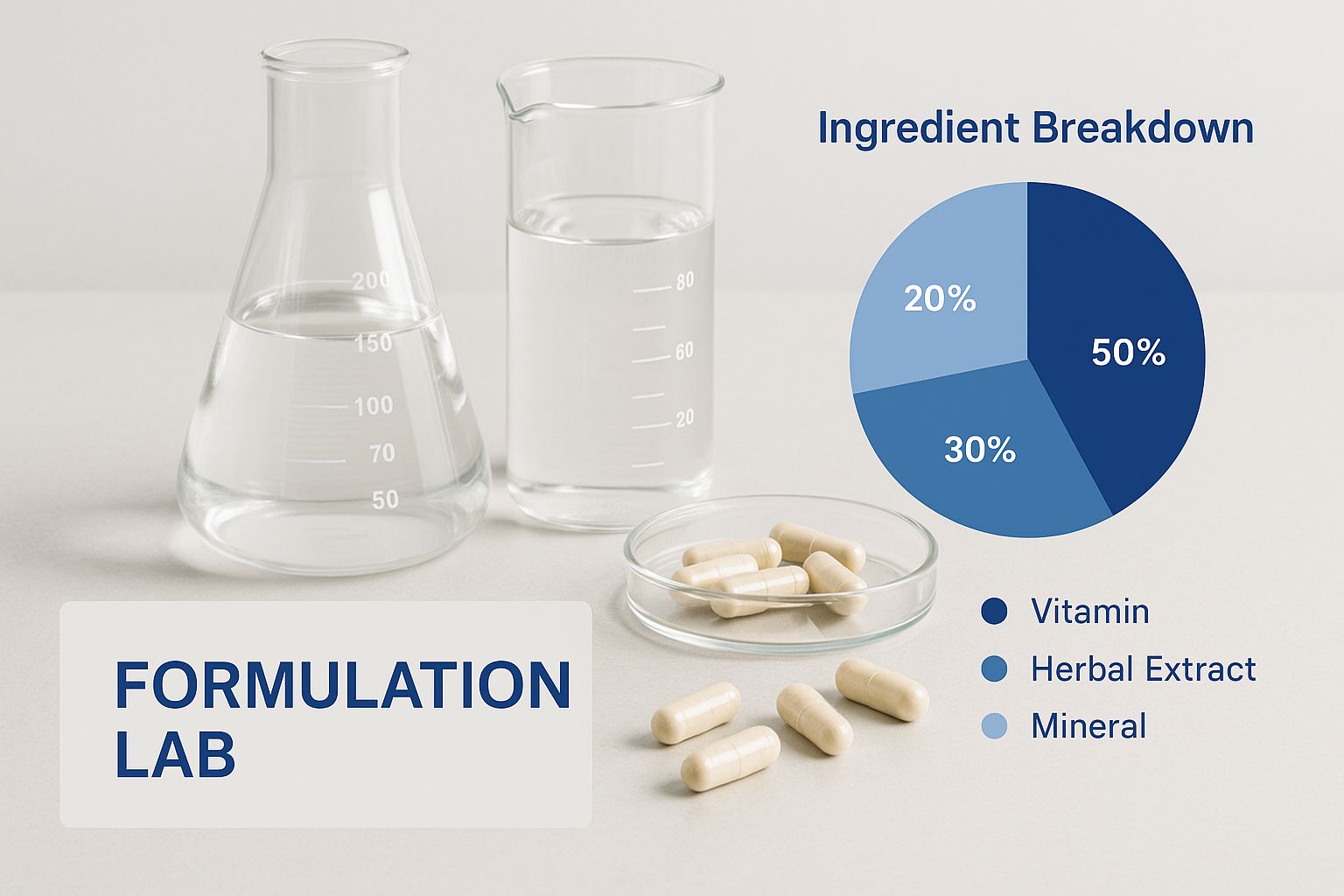How to Start a Supplement Company: A Founder's Guide
Discover how to start a supplement company with this founder's guide. Learn market research, legal setup, cGMP manufacturing, and marketing for your brand.
 Get a Free Quote Today!
Get a Free Quote Today!Thinking about launching your own supplement brand? The journey breaks down into four key phases: building a standout brand, navigating the legal landscape, developing a high-quality product, and executing a smart market launch. But before all that, you need a solid game plan. That starts with deep market research to define your niche and understand the specific customer you’re here to serve.
Building Your Brand from the Ground Up

Long before you source ingredients or design a label, you must build the brand’s foundation. Many founders fixate on a product idea first. The most successful entrepreneurs, however, start with a more fundamental question: "Who are we helping, and why would they choose us over anyone else?" This approach provides a clear roadmap for turning a concept into a viable business plan.
And the opportunity is immense. The global dietary supplements market was valued at an estimated USD 192.65 billion in 2024 and is projected to reach USD 414.52 billion by 2033. This growth isn’t random; it’s driven by a global shift toward preventive health. For a new founder, this means entering a white-hot market where strategic positioning is critical for success.
Finding Your Profitable Niche
A "niche" isn't about being small; it's about being focused. Trying to sell a generic multivitamin to "everyone" is a surefire way to get lost in the noise. Your mission is to identify a specific group of people whose needs are not being fully met by the current market.
Start with a broad category, then narrow your focus significantly.
- Performance: Don't just target "sports nutrition." Get specific. Think "liquid hydration supplements for endurance runners over 40."
- Wellness: "Stress relief" is too broad. Consider "adaptogenic herbal tinctures for busy working mothers."
- Cognitive Health: Move beyond generic "brain boosters." Focus on "nootropic formulas for freelance creatives needing sustained focus."
This level of detail makes every subsequent decision—from formulation to marketing copy—infinitely easier. It transforms your product from another bottle on the shelf into an essential solution for a specific problem.
Defining Your Customer Avatar
Once you've identified your niche, it's time to create a customer avatar—a detailed profile of the single individual who represents your ideal consumer. Give them a name, age, profession, and backstory.
Consider their daily life:
- Health Goals: What are they really trying to achieve? (e.g., deeper sleep, consistent energy, resolving gut issues)
- Pain Points: What frustrates them about current options? (e.g., tired of swallowing pills, capsules upset their stomach, confused by complex ingredient lists)
- Buying Habits: Who do they trust for health advice? Where do they shop? (e.g., specific wellness influencers, functional medicine doctors, niche blogs)
Your customer avatar is your true north. Every time you make a decision about your product, marketing, or brand voice, ask yourself: "What would [Avatar's Name] think of this?"
Mapping the Competitive Landscape
With a clear picture of your customer, it's time to analyze the competition. Don't just look at what they sell; dissect how they sell it. Select 3-5 of your closest competitors and conduct a deep dive into their strengths and weaknesses.
Look for gaps they’ve left open. Perhaps their branding feels cold and clinical. Maybe their flavor options are uninspired. Or maybe they don't offer the convenience of a liquid format. This is where you find your opportunity to shine.
This analysis helps you craft your Unique Value Proposition (UVP)—the single, compelling reason why your brand is the obvious choice for your avatar. As you get started, reviewing brand positioning examples can provide valuable inspiration. Your UVP becomes the core message that connects with your audience and carves out your space in the market from day one.
Navigating the Critical Legal and Regulatory Waters
For any supplement company, compliance is a core part of your brand's DNA. This isn't just about bureaucracy; it's about building your business on a secure, trustworthy foundation that fosters customer loyalty. Before you dive into formulation, you must get your legal structure in order.
First, establish your business as a legal entity. Most founders in this space choose either a Limited Liability Company (LLC) or an S Corporation (S-Corp).
An LLC is often the simpler choice. It's easier to set up and manage, offering a solid combination of personal liability protection and tax flexibility. An S-Corp can provide certain tax advantages as your business scales, but it comes with more rigid compliance requirements. Our advice: consult a legal professional who understands the e-commerce landscape. It's a wise upfront investment.
Understanding FDA and cGMP Requirements
A common misconception is that the FDA "approves" dietary supplements before they are sold. They do not—at least not in the same way they approve pharmaceuticals. However, the FDA heavily regulates the industry under the Dietary Supplement Health and Education Act of 1994 (DSHEA). Your responsibility is not to seek pre-approval but to ensure your products are safe and your claims are truthful.
This is where your choice of a manufacturing partner is paramount. Do not consider a manufacturer unless they meet these criteria:
- FDA-Registered Facility: This is non-negotiable. It confirms the facility is on the FDA's radar and subject to inspections.
- cGMP Certified: This stands for Current Good Manufacturing Practices. This certification is your proof that your partner adheres to the highest standards for sourcing, production, and storage.
- UL Certified: A UL certification adds another layer of trust, verifying that an independent third party has audited the facility's processes and products for safety and quality.
Partnering with a facility that embodies these standards protects your brand from legal risks and, more importantly, ensures your customers' safety. For a deeper look, our guide on FDA regulations for dietary supplements breaks it all down.
Labeling Laws and Making the Right Claims
Think of your product label as a legal document, because it is. It must be 100% accurate and strictly follow FDA guidelines. Errors can lead to significant fines or even a forced recall. The guiding principle is simple: you cannot claim your product treats, cures, or prevents any disease.
What you can make are "structure/function" claims, which describe how an ingredient supports the body's normal structure or function. The distinction is subtle but critical.
| Permissible Claim (Structure/Function) | Prohibited Claim (Disease) |
|---|---|
| "Helps support a healthy immune system." | "Cures or prevents the common cold." |
| "Promotes restful sleep." | "Treats insomnia." |
| "Supports joint health and mobility." | "Reduces arthritis pain." |
Crucially, every structure/function claim on your label must be accompanied by the "DSHEA disclaimer": "This statement has not been evaluated by the Food and Drug Administration. This product is not intended to diagnose, treat, cure, or prevent any disease."
This highly regulated environment is a key reason the U.S. market, valued at USD 67.09 billion in 2024, presents such a significant opportunity. Growth is driven by savvy e-commerce brands that master compliance and connect with an aging population seeking wellness solutions. Success requires nailing your online distribution and adhering precisely to these labeling laws. You can find more data about the U.S. dietary supplements market and its growth drivers to see the full picture.
Finally, nothing builds trust like third-party testing. It is the ultimate proof of your commitment to quality. As your manufacturing partner, we ensure every batch is tested by an independent lab to verify purity and potency. This gives you—and your customers—objective proof that what’s on the label is exactly what’s in the bottle.
Finding The Right Manufacturing Partner
Let’s be crystal clear: your manufacturer isn't just a supplier. They are arguably the most important partner on your entrepreneurial journey. This single relationship will dictate your product quality, define your brand’s reputation, and determine your ability to scale.
Think of them as your R&D partner from concept through launch. The right partner offers more than production capacity; they provide deep industry expertise, unwavering reliability, and a genuine commitment to your success. This choice impacts everything from your speed to market to the trust your customers place in every bottle.
Choosing Your Manufacturing Model
First, you must decide how you want to make your product. There are several paths, each offering a unique balance of customization, upfront cost, and speed. Making the right strategic choice from the start will align with your vision, budget, and timeline.
There are three main models to consider:
- White Label: This is the fastest route to market. You select a product from a manufacturer’s existing catalog of pre-formulated, tested supplements and apply your own label. It's an excellent way to launch quickly with minimal risk and investment.
- Private Label: This is the sweet spot for many emerging brands. You start with a manufacturer's proven base formula but customize key elements like flavor, specific ingredient dosages, or packaging. This model offers significant brand differentiation without the full expense of custom formulation.
- Custom Formulation: If you have a truly unique product concept, this is your path. You will collaborate directly with the manufacturer's R&D team to develop a proprietary formula from scratch. This provides the highest level of differentiation but requires a larger investment and a longer timeline.
To simplify your decision, here’s a quick comparison.
Manufacturing Model Comparison
Choosing the right manufacturing approach is a foundational decision for your business. This table provides a clear comparison to guide you.
| Model | Best For | Speed to Market | Customization Level | Upfront Cost |
|---|---|---|---|---|
| White Label | Brands needing the fastest, lowest-cost market entry. | Fastest (Weeks) | Minimal (Label Only) | Lowest |
| Private Label | Brands wanting a unique product without full R&D costs. | Moderate (1-3 Months) | Medium (Flavors, Ingredients) | Moderate |
| Custom Formulation | Brands with a unique vision seeking maximum differentiation. | Slowest (3-6+ Months) | Complete | Highest |
For most new liquid supplement brands, private label manufacturing is the ideal starting point. It provides the flexibility to create a distinctive product without the heavy R&D costs and extended timelines of a fully custom formula.
Essential Questions To Ask A Potential Partner
Once you have a shortlist of potential manufacturers, it's time to dig deeper. This process is about more than comparing price quotes; it’s about vetting their processes, certifications, and capabilities. A transparent, high-quality partner will welcome these questions.
The answers you receive will reveal their expertise and reliability. For a more exhaustive checklist, we've created a detailed guide for finding a reputable supplement manufacturer that covers all the bases.
This is the kind of professional, sterile lab environment you should expect from any top-tier partner you consider working with.

The image showcases the clean, precise, and scientific setting that is absolutely necessary for creating high-quality, safe supplements.
Non-Negotiable Certifications And Capabilities
Certain credentials are not just "nice-to-haves"—they are absolute deal-breakers. These certifications guarantee that a facility operates at the highest industry standards for quality and safety.
Do not compromise on these three core requirements:
- cGMP Certified: Current Good Manufacturing Practices are the gold standard. This certification means the manufacturer follows strict, FDA-enforced protocols for every step, from raw ingredient sourcing to final packaging.
- FDA-Registered Facility: The manufacturer must be registered with the Food and Drug Administration. This is non-negotiable and confirms they are compliant with federal regulations and subject to official FDA inspections.
- Third-Party Testing: A trustworthy partner provides Certificates of Analysis (CoA) from independent labs for every batch. This verification confirms the purity and potency of your product, ensuring what's on the label is precisely what's in the bottle.
Beyond certifications, ask about their technology. For liquid supplements, inquire about their extraction methods and production technology. For example, advanced cold-fill technology is a game-changer for preserving delicate botanical compounds that traditional heat-based processes can destroy.
Finally, discuss logistics. What are their minimum order quantities (MOQs)? A partner offering flexible run sizes, from pilot to full scale, allows you to test the market before committing to a large order. Ask about their turnaround times and, crucially, their on-time delivery record. A reliable partner provides transparent timelines and sticks to them, keeping your launch on track.
Developing a Product That Stands Apart
A memorable brand needs a hero product. Once you've secured a manufacturing partner who acts as a true collaborator, the exciting work begins: creating a supplement that is effective and captures consumer attention. This is where science, quality ingredients, and your brand story converge in one bottle.
Transforming a great idea into a physical product is a blend of art and science. It’s about more than just combining ingredients; it’s about crafting a formula that is effective, enjoyable to take, and unique to your brand.
The Science of a Superior Formula
The heart of any great supplement is its formula, which starts with sourcing high-quality, scientifically-backed ingredients. Every raw material must have a clear purpose supported by solid evidence to ensure your product delivers on its promises.
This is where formulation science comes into play. We partner with brands to innovate beyond standard powders and capsules, focusing on advanced techniques for liquid supplements.
- Advanced Botanical Extraction: We utilize proprietary, temperature-controlled extraction methods. Unlike harsh, high-heat processes that can degrade delicate plant compounds, our approach preserves the full spectrum of an herb’s active components.
- Maximizing Bioavailability: An ingredient is only as effective as the body's ability to absorb it. Our R&D team specializes in creating synergistic formulas where ingredients work together to enhance absorption, ensuring your customers feel a real, noticeable difference.
Building a standout product from the ground up can seem daunting. For a more detailed guide, see our article on how to create a supplement formula, which breaks down the crucial steps.
The Art of Flavoring and Experience
Efficacy is essential, but the user experience is what builds loyalty. No one wants to take a supplement that tastes medicinal, especially a liquid taken daily. The art of flavoring is a critical component that many new brands overlook.
Our flavor experts can help you develop a taste profile that perfectly aligns with your brand. Whether you envision a zesty citrus for an energy tincture or a calming vanilla-chai for a sleep formula, we can create a flavor that customers look forward to, turning a daily task into a pleasant ritual.
Packaging That Tells Your Brand Story
Your product’s packaging is its first impression. It acts as your silent salesperson on a crowded digital shelf. It must be compliant and protective, but above all, it must be compelling.
Think of your packaging as a physical extension of your brand’s identity.
- Material and Form: Will you choose amber glass bottles to protect light-sensitive ingredients and convey a premium, apothecary feel? Or perhaps sleek, recyclable plastic with a convenient dropper top?
- Label Design: The label must instantly communicate your unique value. It should be clean, easy to read, and connect emotionally with your ideal customer. It's your best opportunity to tell a visual story.
Great packaging does more than hold the product. It reinforces trust and makes the customer feel confident in their choice before they even open the bottle. It is the final, critical piece in crafting a premium and trustworthy experience.
This focus on the complete product experience is vital in an exploding market. The global nutritional supplements market, valued at USD 386 billion in 2024, is projected to reach USD 759 billion by 2034. A major driver of this growth is the use of AI in R&D to create more personalized nutrition. By focusing on unique formulas and a superior user experience, new companies can carve out a significant market share. You can learn more about these nutritional supplement market trends and how they are shaping the industry.
Launching Your Brand into the Market

You've done the hard work. You have a high-quality product ready to go, and your legal and regulatory requirements are met. Now comes the exciting part: your go-to-market strategy.
This is the moment your brand steps into the spotlight and begins connecting with the customers you've worked so hard to understand. A successful launch isn't about hoping for the best; it’s a calculated, multi-channel effort designed to build momentum and drive those crucial first sales.
Building Your E-commerce Foundation
Your website is your digital headquarters—your storefront, brand story, and primary sales engine. For most supplement startups, a platform like Shopify is the ideal choice. It's powerful, scalable, and designed for e-commerce, allowing you to get up and running without extensive technical expertise.
The key to a successful store is focusing on conversion rate optimization (CRO) from day one. Every element of your site should be designed to guide a visitor toward making a purchase.
- A Seamless Customer Journey: Your homepage must instantly communicate your unique value. Product pages need compelling descriptions, high-quality images, and clear ingredient information. Don't make people search for answers.
- A Painless Checkout: Nothing kills a sale faster than a complicated checkout process. Keep it to a minimum number of steps, offer multiple payment options, and be transparent about shipping costs upfront.
- Essential Trust Signals: Prominently display your cGMP certification, third-party testing badges, and early customer testimonials. These elements build confidence and overcome buyer hesitation.
Think of your e-commerce site as more than a place to transact. It should be an extension of your brand, educating and building trust with every click.
Tailoring Your Digital Marketing Strategy
Marketing supplements has its own unique rules. You must educate your audience and build significant trust, all while navigating the strict advertising policies of major platforms.
Content marketing is your most powerful tool. Instead of a hard sell, focus on creating valuable content that directly addresses your ideal customer’s problems.
A blog post on "The Top 5 Adaptogens for Managing Daily Stress" will attract a more qualified audience than a simple ad shouting, "Buy Our Stress Formula!" As you prepare, exploring different digital marketing strategies for small businesses can provide a solid playbook.
Your marketing shouldn't just sell a product; it should offer a solution. Position your brand as a trusted authority and educational resource in your niche, and the sales will follow.
Social media is where you build your community. Don't just post product shots. Share user-generated content, host Q&A sessions with a nutritionist, and create posts that add genuine value to your followers' lives. Focus on the platforms where your audience actually spends their time, whether it’s Instagram, TikTok, or a niche Facebook group.
Navigating Paid Ads and Influencer Collaborations
Paid advertising on platforms like Meta (Facebook and Instagram) or Google can be highly effective, but it requires precision. Supplement ads are heavily scrutinized, so you must be meticulous about your claims. Stick to approved structure/function claims and focus your ad copy on benefits, not cures.
Forget broad targeting. Use your customer avatar to create highly specific audiences. For instance, you could target users who follow certain wellness influencers, have shown interest in organic products, and fall within your key age demographic.
Influencer collaborations are another powerful way to generate initial buzz. Look for micro-influencers with smaller but highly engaged followings in your specific niche. An authentic recommendation from a trusted voice can be far more powerful and cost-effective than a traditional ad.
Creating a Powerful Launch Plan
Your launch should be a carefully orchestrated campaign that builds anticipation and momentum, not a single-day event. A phased approach maximizes your impact.
- Pre-Launch Buzz (2-4 weeks out): Start teasing your brand on social media. Run a giveaway to build an email list of interested customers.
- Influencer Seeding (1-2 weeks out): Get your product into the hands of chosen influencers so they can try it and prepare content to go live on launch day.
- Launch Day Push (Day 0): Announce your launch across all channels. Your influencers post their content, you email your pre-launch list with an exclusive offer, and you activate your first paid ad campaigns.
- Post-Launch Follow-Up (First 30 days): Your focus now shifts to gathering social proof. Encourage your first customers to leave reviews and share their experiences. Feature their testimonials prominently on your site. This initial feedback loop is critical for building long-term trust.
Got Questions? Here’s What New Founders Usually Ask
As you piece this all together, from concept to a launch-ready product, questions will inevitably arise. Starting a supplement company involves many moving parts, and it’s easy to get bogged down in the details.
We’ve compiled straightforward answers to the most common questions we hear from founders who are exactly where you are now. This is practical, real-world advice to help you move forward with confidence.
What Does It Really Cost to Start a Supplement Company?
There’s no single answer, but a realistic budget is between $10,000 and $50,000 to get started. The final cost depends on several key decisions.
The biggest variable is your manufacturing model. The private label route is significantly more affordable upfront than developing a fully custom formula. Other major costs include your initial inventory (driven by Minimum Order Quantities, or MOQs), branding and web design, and your marketing budget for the launch.
For founders focused on capital efficiency, a pilot run with a private label manufacturer is the smartest way to validate your concept and test the market before committing to a larger investment.
Do I Need FDA Approval Before I Can Start Selling?
This is a critical point of confusion. The short answer is no; the FDA does not "approve" dietary supplements before they are sold.
However, this does not mean the industry is unregulated. The FDA closely monitors the market to ensure products are safe and accurately labeled. Your manufacturing partner must operate an FDA-registered facility and adhere to cGMP (Current Good Manufacturing Practices). As the brand owner, you are ultimately responsible for your product's safety and ensuring every claim on your label is truthful and substantiated.
What Is the Most Important Thing to Look for in a Manufacturer?
It's tempting to decide based on price alone, but that's a mistake. The two non-negotiables are quality and compliance. Your brand's reputation depends on the integrity of your product.
Before signing any contract, verify that the manufacturer is cGMP certified and operates an FDA-registered facility. Ask for proof of third-party testing to confirm the purity and potency of your ingredients. Once those fundamentals are covered, look for a true partner—one who offers flexible run sizes, communicates clearly, and can serve as an extension of your R&D team as you grow.
How Do I Actually Make My Supplement Brand Stand Out?
In a crowded market, being a generalist is the fastest path to invisibility. Differentiation is essential.
Here are a few ways to carve out your own space:
- A Unique Formula: Go deep into a specific niche. Think liquid herbal blends for vegan endurance athletes or a stress-support tincture for busy executives.
- Superior Ingredients: Build your brand story around an ethically sourced, high-potency ingredient that competitors aren't using.
- An Innovative Format: Solve a real problem. A great-tasting liquid tincture can be a game-changer for customers tired of swallowing pills.
- Exceptional Branding: Don't just sell a product; build a community. Create a brand that connects with people on a deeper level through valuable content and genuine education.
The goal isn't to appeal to everyone. The goal is to be the only choice for a very specific somebody.
Ready to stop researching and start building? At Triton Nutra Group, we’re more than a manufacturer; we're your R&D partner, here to guide you from a great idea to a market-ready liquid supplement. Let's create something that truly stands out. Request a free consultation today.